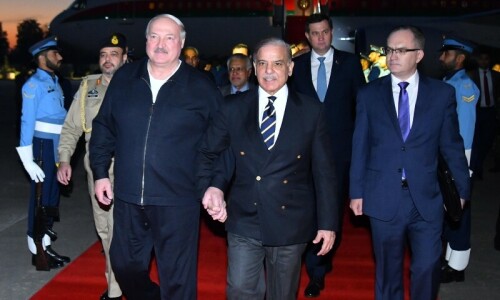Police fired shots in the air as thousands of protesters took to the streets on Tuesday in the latest clashes in the Indian capital over a new law that makes it easier for non-Muslims from neighbouring countries to gain citizenship.
Nationwide opposition to the Citizenship Amendment Act — which offers a path to Indian citizenship for religious minorities from Afghanistan, Bangladesh and Pakistan — has grown since last week, but Prime Minister Narendra Modi's government appears to have dug in its heels.
The Indian prime minister was adamant that the Citizenship Amendment Act (CAA), passed last week, would not affect Indian nationals, including Muslims.
He blamed the opposition Congress party for “spreading violence and creating an environment of fear” by lying about the law's intent.
“It's as clear as being engraved in stone that the CAA will not affect any citizen — Muslim, Hindu, Christian or anyone else,” Modi told a political rally in eastern Jharkhand state.
“This is guerrilla politics, they should stop doing this.”
“Both my government and I are firm like a rock that we will not budge or go back on the citizenship protests,” Home Minister Amit Shah told the Times Network, which runs TV channels, in an interview.
But critics say the law weakens India's secular foundations since it does not apply to Muslims, who have been coming out on to the streets in increasing numbers against the legislation.
In Delhi's Seelampur area, police fired shots in the air and lobbed more than 60 rounds of tear gas to beat back thousands of people protesting against the new law.
Police officer Rajendra Prasad Meena said the demonstration spiralled out of control after some protesters started throwing stones at policemen who were holding them at a barricade.
“Then the situation worsened and we had to fire tear gas,” he said, adding that police fired rounds in the air once to push back the violent mob.
An official at the nearby Jag Pravesh Chandra Hospital said it had received around 10 people, including policemen, with injuries sustained during the protest. Most were discharged, and two referred elsewhere.
Cars were damaged and a wide road strewn with rocks while two motorbikes were set on fire, sending thick smoke into the air.
Groups of youths, some with their faces covered, threw bricks, stones and bottles at police, who retaliated with tear gas and baton charges.
Sahil, a protestor who gave only one name, said the new law had to be withdrawn. “It is against the constitution,” he said, holding up a hand-written poster as the large crowd began dispersing.
Mohammad Daud, the imam of a local mosque who helped calm the confrontation, said it began as a protest against the new citizenship law.
“We should protest against it, and we will protest against it. Neither is this a fight against the police, or a Hindu-Muslim issue. We only have a problem with the government,” Daud said.
Tens of thousands more rallied in West Bengal, Kolkata and Tamil Nadu states on a sixth day of nationwide protests.
'People won't accept the law'
In the eastern city of Kolkata, more than 20,000 protesters joined a fresh march led by West Bengal Chief Minister Mamata Banerjee, a fierce critic of Modi.
Banerjee, who also led protests on Monday, told the crowd the law would not be implemented “for as long as I am alive”.
Filmmaker Gautam Ghosh, also at the march, told AFP the law would “divide the country”.
“If the federal government tries to implement the law, there will be more bloodshed. People will not accept it,” he added.
Train services were disrupted after railway tracks were blocked by protesters, while nearly 700 people have been arrested, Banerjee said.
Authorities have imposed internet blackouts and used force to shut down rallies and sit-ins across several states.
In the northeastern state of Assam, the epicentre of the protests where four people died after being shot by police, a curfew imposed in some regions was lifted early Tuesday.
Calls for police restraint
The new round of rallies came as the Supreme Court on Tuesday referred petitions calling for a probe into allegations of police brutality to the states' High Courts.
Rioters had torched vehicles while police with batons fired tear gas and charged protesting students before storming Delhi's Jamia Millia Islamia university late Sunday.
The university's vice-chancellor said Monday 200 people were injured but police put the number at 39 students hurt with 30 officers also injured, one of them critically.
Ten people had been arrested for rioting and mob violence but none of them was a student, police told the Hindustan Times on Tuesday.
Human Rights Watch called for police to show restraint, amid claims authorities were using unnecessary or excessive force to quell the unrest in several cities.
Amnesty International also called for police to be investigated over allegations student protesters from Aligarh Muslim University in Uttar Pradesh state were beaten up by officers.
“Students have the right to protest. Violence against peacefully protesting students cannot under any circumstance be justified,” Amnesty India's executive director Avinash Kumar said in a statement.
'Refugee crisis'
There have been growing questions about the stance of the government, led by Modi's Hindu-nationalist party, towards India's 172 million Muslims, who make up 14 per cent of the population.
The citizenship law follows the revocation of the special status of the Muslim-majority Kashmir region, and a court ruling clearing the way for the construction of a Hindu temple on the site of a mosque razed by Hindu zealots.
Prime Minister Imran Khan said India's actions in Kashmir and on the citizenship law could drive Muslims from India and create a refugee crisis.
“We are worried there not only could be a refugee crisis, we are worried it could lead to a conflict between two nuclear-armed countries,” Khan told a Global Forum on Refugees in Geneva.













































